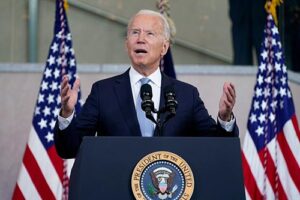A year after the United States suffered its most serious brush with constitutional failure since the Civil War — on January 6, 2021 — American democracy continued its descent into the abyss. Meanwhile, the Biden administration tried to put lipstick on the pig by inviting 110 countries to participate in the “Summit for Democracy.”
Pakistan, the fifth-largest country globally, with a functioning democracy, did not attend. The shortcomings in Pakistan’s democratic apparatus primarily stem from the interference of global players, including the USA, who exercise influence over vital elements of Pakistan’s security and foreign policy.
Democrat and Republican talking heads in America claim that after its withdrawal from Afghanistan, Pakistan is no longer significant to the US. However, China-Pakistan ties have kept both the State Department and the Pentagon on their toes.
For its part, Pakistan has ceased reacting to the United States’ carrot and stick approaches. The Taliban’s triumph in Afghanistan and the withdrawal of US forces from the nation after almost two decades, has changed the geopolitical terrain of Central and South Asia. Pakistan, which has openly and secretly supported the Taliban since before the US forced the organisation out of Kabul in 2001, may take some solace in the success of its long-term partner.
Still, events in Afghanistan in August 2021 upended Islamabad’s relationship with Washington. Pakistan’s civilian and military leaders appeared to have grown accustomed to the status quo of recent years. The Taliban gradually gained control of more territory. At the same time, US and NATO forces’ aims and ambitions waned, even as they retained responsibility for propping up Kabul’s weak government (with Pakistan’s help). Islamabad must now devise a new strategy with a more coherent and intransigent government than Kabul has had in a generation. In Washington, there is growing resentment over the perception that Pakistan contributed significantly to the US’ loss in the longest war in US history.

Before invading Afghanistan in 2001, the US offered Pakistan two options: renounce the Taliban and help the US, or continue to back the group and become a de facto opponent of the US war effort. General Pervez Musharraf, who took over the country in a military coup in 1999, chose the middle ground. He opted to assist US forces in their pursuit of al-Qaeda operatives fleeing Afghanistan, including utilising Pakistani highways and aircraft. He did, however, give asylum to key Taliban officials and material and advisory assistance to the group when it recovered a foothold in Afghanistan in the mid-2000s.
American officials have been dealing with the aftermath of the surprise Taliban capture of Kabul in August and the ensuing rushed evacuation. Now attention has moved to recognise the mistakes committed in the Afghan conflict. Washington is examining where things went wrong, and Pakistan, given its long relationship with the Taliban, is seen as a factor.
General Mark Milley, Chairman of the Joint Chiefs of Staff of the United States, stated in congressional hearings on Afghanistan in September 2021 that “we need to properly investigate the role of Pakistan[‘s provision of] sanctuary” in understanding how the Taliban succeeded. Similarly, during another congressional hearing last year, US Secretary of State Antony Blinken stated, “This is one of the things we’re going to be looking at in the days and weeks ahead — the role that Pakistan has played over the previous 20 years.” He went on to say that the US administration was considering “the role we would want to see [Pakistan] play in the coming years and what it would take for it to achieve that,” implying that a review of how to engage with Islamabad in the future was underway.

In the Senate, 22 Republican senators have introduced legislation to censure Afghanistan’s new Taliban administration and nations that have helped the Taliban. The bill also requires a report that includes “an assessment of support by state and non-state actors, including the government of Pakistan, for the Taliban between 2001 and 2020,” as well as “sanctuary space, financial support, intelligence support, logistics and medical support, training, equipping, and tactical, operational, or strategic direction.”
On December 15, 2021, the US Senate overwhelmingly passed a version of the National Defence Authorisation Act, or NDAA, authorising $778 billion in defence spending — $25 billion (a 5 percent increase from the previous one) more than President Joe Biden had requested — sending the measure to the White House for signature. It is larger than those enacted during the Vietnam and Korean Wars and Ronald Reagan’s military buildup. For the yearly legislation outlining the Department of Defence policy, the bill had substantial support from both Democrats and Republicans.
Pakistan’s Senate, in turn, expressed “concern” over the measure introduced in the United States Senate, which Pakistan’s media labelled as “anti-Pakistan.”
Pakistan is being blamed for the US military and Afghan leadership’s failings while disregarding its backing for the Taliban. It has not formally recognised the new Taliban rule. Still, it has been making a deliberate effort to interact with it, with government officials making the case in speeches, op-eds, and interviews.

In his speech to the United Nations General Assembly, Pakistani Prime Minister Imran Khan went beyond calls for humanitarian aid and financial liquidity to prevent Afghanistan’s economic collapse, saying that “we must strengthen and stabilise the current government, for the sake of the people of Afghanistan.”
America wants Pakistan to not formally recognise the Taliban administration and use its influence in building a “Washington-friendly” government.
Despite an adverse geopolitical climate in which the United States and Pakistan have close relations with each other’s adversaries (India and China, respectively), there are still prospects for collaboration in non-security areas. Cooperation is always possible when interests coincide. Pakistan now seeks stronger relations based on geoeconomics.

Editor, Narratives



